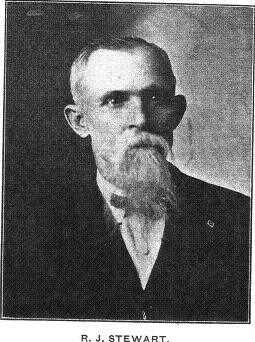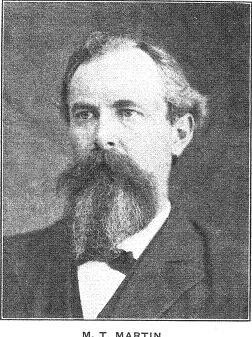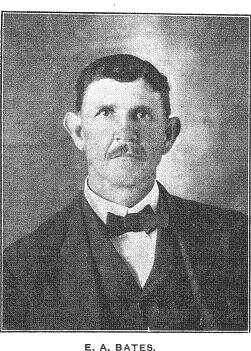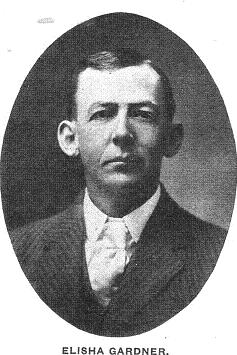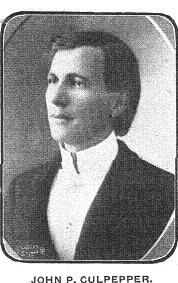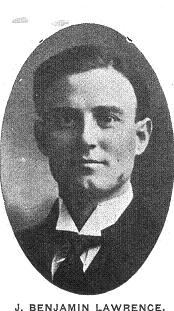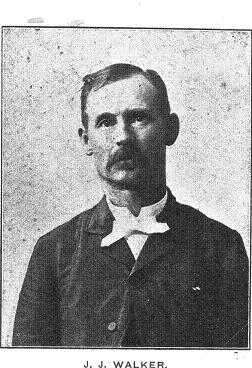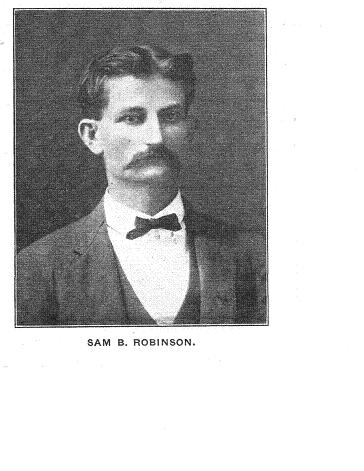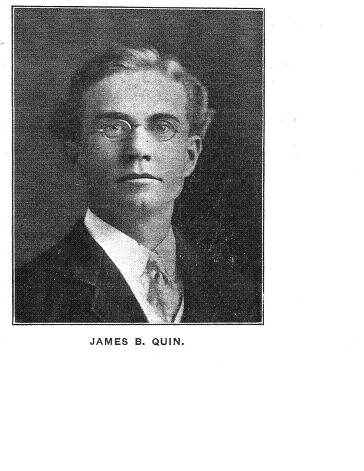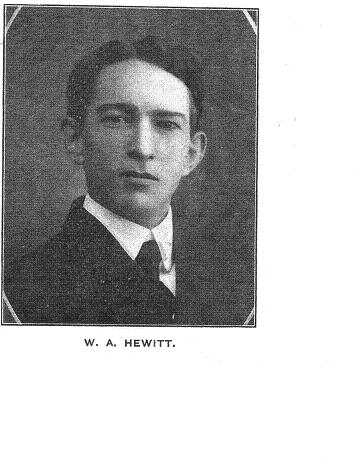Abstract History of the Mississippi Baptist Association,
From Its Preliminary Organization in 1806 To The Centennial Session in 1906
By T. C. Schilling(1890-1899)
1890 -- Ramah, in Franklin county, is the place of meeting on the 10th of October. And this is the eighty-fourth annual session. D. S. H. Cox delivers the opening sermon from Ezekiel, 21:27, "I will overturn, overturn, overturn it; and it shall be no more, until he come whose right it is; and I will give it him."
There are twenty-five churches at this time, and the body is organized by re-electing R. J. Stewart and W. P. Gardner as moderator and treasurer respectively, while John P. Hemby goes to the clerk's table. Mt. Vernon church, Amite county; was received, Elder D. A. Given being the delegate.
A number of prominent visitors were in attendance, as follows: E. P. Douglas, W. F. Parsons, T. W. White and J. H. Gambrell came from the Fair River Association; E. B. Seale from the Carey; J. O. Green from the Union; J. B. Gambrell and B. D. Gray from the Convention Board.
The committee having in hand the matter of assisting Miss Mattie Cook at Blue Mountain reported receipts at $112.50. W. Everett was chairman.
The matter of Christians owning stock in fair associations where gambling was practiced had the right of way again this year, there being an apparent difference of opinion on the subject. The Summit church sent a "Preamble and Resolution," claiming that "doubtful, not to say erroneous," ideas existed as to the nature of the power possessed by the Association in the matter of correcting evils that might exist in the churches, and recommending that a committee of five or more discreet and thoughtful brethren be appointed, whose duty it should be to examine thoroughly into the rules and powers of the Association in the matter of withdrawing from a disorderly church, etc.
The committee through its chairman, H. S. Archer, made this report: "The Association has the power to withdraw from any church in the Union of churches, as an Association, which she deems unsound in principle or immoral in practice. But before withdrawing she should endeavor to correct the error in faith or practice by giving the best advice in her power."
J. B. Gambrell offered, and the Association adopted, the following resolutions on the same subject:
"Resolved, 1st, That the participation of members of churches belonging to this body in fairs where gambling is allowed and openly practiced is a cause of offense to the brotherhood, a source of division and strife among God's children, and a great hindrance to the progress of the cause of Christ in our bounds.
[p. 200]
"Resolved, 2nd, That we appeal in the spirit of Christian love to those brethren who are connected with any and all institutions which allow gambling to withdraw from them, and put their influence on the side of Christ and public morals, and remove from among us a cause of trouble, and save this body the painful necessity of exercising discipline on such churches as allow such practices."On the Lord's day at 9 a. m. Mrs. P. L. Bates gave a lesson on the Tabernacle. At 11 a. m. J. B. Gambrell preached in the house and D. A. Given at the stand.A strong report on prohibition was presented by J. H. Gambrell, and pending its adoption he addressed the Association and took a collection for the Prohibition Bureau at Meridian, Miss.
The report on "State of Religion" complains of a too low standard of morals among the churches. As an evidence, moderate dram-drinking, intercourse with the world, desecration of the Sabbath, etc., are spoken of as being prevalent. Fair associations also come in again for a share of rebuke. H. I. Weathersby was chairman of the committee, and he exhibited a strong desire for more personal piety and greater consecration.
The report on Mississippi College was presented by D. A. Given, and while it was before the body J. B. Gambrell made an address on College Endowment and secured in pledges the sum of $1,100.
Strong resolutions were passed, expressing disapproval of the action of the Constitutional Convention, then in session, in failing to provide for the overthrow of the liquor traffic in Mississippi. Also the manner in which the suffrage question was being treated, was complained of. Furthermore, the Association put its stamp of disapproval on the proposition to keep open on the Lord's day the doors of the great World's Fair at Chicago in 1891, such a course being "unwise, unpatriotic, un-American and unchristian."
In connection with the report on Lea Female College, the Liberty, Gillsburg and East Fork schools were recommended.
[p. 201]
R. J. Stewart was born December 18, 1847. His father was a native of Scotland, and died when the subject of this sketch was about eight years old. This sad event, followed by the Civil War, circumscribed his opportunities, and deprived him of early educational advantages, he being in school only a fe\v months each year for five or six years. In October, 1864, he enlisted in the Southern Army, joining a cavalry company. At the close of the war his two elder brothers, who had gone through the four years'
R. J. STEWART.strife, returned home and relieved him of many grave responsibilities. In November, 1864, he was received by Mt. Vernon church, Amite county, but, because of the enemy in the neighborhood, he was not baptized until January 8, 1865. His marriage to Miss Sophia L. Davis, a native of Georgia, but reared in Mississippi, occurred December 8, 1868.
Mr. Stewart moved to St. Helena parish, La., in 1871, and on the 14th of February, 1872, he went into the organization of
[p. 202]
Rocky Creek church. He was first ordained to the office of deacon. He was licensed to preach August 5, 1877, and ordained March 3, 1878, Elders Geo. M. Hayden and Thomas Lansdell composing the presbytery. He was then called to serve this church at a salary of $75. At this time he was opposed to a fixed salary for preachers, and suggested to the members not to make any promise, but to pay what they could, to which they agreed.. He sometimes walked to his appointments, a distance of six miles, preaching one Saturday and Sunday in the month. His salary for this year, under the "pay-what-you-can" plan, did not reach the $75, there being a shortage of $74.10. This experience was largely instrumental in bringing about his conversion on the question of salary, and he was no doubt better prepared to strengthen his brethren on the subject.Mr. Stewart relates two amusing incidents which occurred during his early ministry. (1) Occasionally he would mention his misfortune of being uneducated. One day an educated brother advised him to do so no more, saying: '' One-half the people will never find it out unless you tell them; the other half will find it out soon enough." (2) A member of a church to which he preached did not have the money to pay him, and proposed to let him have some syrup, to which he agreed. "When this brother brought the syrup he was asked the price per gallon, and said: "Forty cents cash or fifty cents in trade. I will let you have it at fifty cents."
In 1878 he was elected clerk of the Mississippi River Association and served six years. He was also moderator one year. In January, 1888, he moved from Greensburg, La., to Liberty, Miss., where he still resides. He assisted in organizing .five churches in the Mississippi Association, and served as moderator six years, from 1889 to 1894, inclusive. He has been pastor at Liberty, East Fork, Zion Hill and other places in Amite county. The number of baptisms administered by him is estimated at nearly one thousand. He has given his children good educational advantages, having one lawyer and one physician in his family. His wife died some years ago.
1891 -- The meeting this year was held with Galilee church, Gloster, beginning October 9th. John P. Hemby preached the introductory sermon from Luke, 17:15. The reading clerks were H. I. Weathersby and E. Gardner,
[p. 203]
and the body was organized by re-electing the former officers. Visitors were as follows: Mississippi College and Baptist Record, J. A. Hackett.
Convention Board, H. F. Sproles.
Board of Ministerial Education, L. Ball.
Sunday School Board, S. B. C., W. H. Robert.
Carey Association, H. S. Archer.
Union, W. W. Bolls.
Mississippi River, H. N. Kerr.Two more churches, Mt. Pleasant and Mt. Olive, Amite county, were admitted.
There was still an Executive Board, and they had employed Elder S. H. Thompson to labor in the Homo Chitto valley at a salary of $150 for one-fourth his time.
It was reported that Miss Mattie Cook's health was failing, and the matter of her further education was indefinitely postponed. J. H. Lane, T. J. J. Spurloek and. Dr. C. H. Bates composed the committee.
Lewis Ball, of blessed memory, presented a fine paper on "Ministerial Education," from which this extract is taken: "The ministry educated at Clinton have largely, very largely, carried the denomination to the forefront. The estimate shows that the Baptists control fifty per cent, of the people of the State. This is attributed by other denominations to the work done in Mississippi College in the education of our ministry. Hence the erection of Millsaps College in Jackson. Bishop Galloway perhaps had no lever equal in the way of incentive to get money for that college as the use made of the work done in our college. * * * What then? Down upon your knees with hearts full of travail; implore the Lord of the harvest to send laborers to gather in the sheaves."
H. F. Sproles read the report on the "Centennial of Missions," beginning:
"On the last day of May, 1792, Wm. Carey, a pious cobbler and consecrated minister of the gospel, preached a great sermon on missions at Kettering, England, which excited a deep interest in and awakened a sense of responsibility for the perishing heathen. This was the beginning of the modern missionary enterprise. In order to increase this interest, to quicken zeal, to encourage systematic effort and prayer for the evangelization of the world, Baptists propose to celebrate that great event."Meetings will be held in 1892 at Kettering by the English Baptists; at Philadelphia by the Northern Baptists, and at Louisville by the Southern Baptists.
[p. 204]
"Glance at the field in the beginning of this missionary century. China was hermetically sealed. It was death to preach the gospel in Japan. India was closed to all missionaries; even Carey had to seek shelter on a little plot of ground owned by a foreign power. South America was tabooed by Romanism. Asia Minor was inaccessible. Mohammedanism stood in its pride and independence. The difficulties of Africa deterred the most adventurous. Only the inhabitants of the enervating islands of the South Seas and those of the Polar regions were accessible. There was but little interest. Everything was new and strange. Language had to be learned and clothed in the forms of written speech. The "Word of God had to be translated into these newly formed languages. The laborers were few, untrained and inexperienced. There were no native helpers. How different are the conditions of the mission fields now. The whole world is open to missionary enterprise. Thibet is probably an exception, but even in that country the Moravians have entered with the gospel. * * * The whole world is now at our door. It is only a few weeks' easy travel by land or sea to reach the most distant parts."There was preaching on the Lord's day in the different churches in Gloster by Elders H. F. Sproles, L. Ball, J. P. Hemby, J. A. Hackett, C. H. Otken, D. S. H. Cox and E. Gardner.About this time the question of college removal was a live one with Mississippi Baptists, and the "old Mississippi" expressed her sentiments in the following resolution:
"Be It Resolved, That in our opinion the removal of Mississippi College would be unwise and we request that it remain at Clinton."
A memorial was presented on the subject of fair associations, a question that has disturbed the ranks of the Association for some time. The belief is again expressed that ministers were encouraging such fairs by owning stock in them, "while others aid and abet such action." In closing their report, the committee said: "It is the judgment of your committee that gambling at fairs or elsewhere is an evil and a sin and should be discouraged; and, if churches are charged and convicted of tolerating such practices, it is the duty of the Association to withdraw the hand of fellowship from such church or churches."
A set of resolutions was passed expressing sympathy with the good people of Louisiana in their heroic struggle against the great lottery swindle, and pledging hearty co-operation to the
[p. 205]
people of that State in their efforts to drive out this public iniquity. And the clerk was instructed to send copies of the resoluions to the Baptist Chronicle, Ruston, La.; the New Orleans Christian Advocate and the New Delta, New Orleans; also to the Southern Baptist Record, Meridian, Miss.The following was the arrangement of pastors and churches this year:
T. C. Schilling served Bethel and Ebenezer.
J. P. Hemby was pastor of Bethlehem, Galilee and New Zion.
R. J. Stewart preached for Concord, Liberty and Zion Hill.
J. H. Lane was bishop of East Fork, Mars Hill and Hebron.
D. S. H. Cox ministered to Hopewell, Mt. Zion and Siloam.
J. C. Gadd was pastor at McComb City.
J. M. Stroud served Mt. Pleasant and New Hope, Franklin county.
S. H. Thompson preached for Mt. Pleasant, Amite.
D. A. Given was bishop of Mt. Vernon.
Elisha Gardner ministered to Mt. Olive.
J. R. Baham preached for New Hope, Amite.
Thomas Lansdell served New Providence.
I. W. East was pastor of New Salem.
Joseph Buckles ministered to Ramah.
W. J. Weatherly served Sarepta.
S. W. Sibley was bishop at Summit.1892 The saints of the old Mississippi assembled at McComb City on the 7th of October. J. C. Gadd delivered the Associational sermon at night from Exodus, 14:15 — "Go forward." Theme: "Religious Progress," Twenty-six churches sent letters and messengers, and the .body was organized by continuing the same moderator and clerk, while S. R. Quin was chosen treasurer.
A number of corresponding messengers were present, viz.:
Mississippi River Association — William Jones.
Bogue Chitto — S. C. Walker, W. R. Walker, C. S. Curtis, W. F. Yarborough and I. Allmand.
Fair River — E. P. Douglas, A. Reeves, W. H. Bailey.
Union — J. Jasper Green.
Homo Chitto (Col.) —Dennis Thomas.
Board of Ministerial Education — L. Ball.
Mississippi College — R. A. Venable.
[p. 206]
One new church, Arlington, was received.On the Lord's day preaching services were held at the various churches in McComb by Elders R. A. Venable, L. Ball, C. H. Otken, J. H.. Lane, R. J. Stewart, J. P. Hemby and J. M. Cook.
There were a few changes in the pastorates. E. Gardner served Hebron and Mt. Olive; E. T. Smith was pastor of Mt. Pleasant (Amite); J. R. G. Reeves was bishop at Mt. Vernon; S. H. Thompson preached for New Salem, and D. A. Given ministered to Hopewell and Mt. Zion.
There were 164 baptisms, 3,026 members and an aggregate of $5,371.76 reported this year, and the usual subjects of denominational interest were considered.
The following is the list of churches and delegates appearing in 1892:
Arlington — S. J. Hodges and H. N. Ellzey.
Bethel — R.. P. Bates and J. M. Smith.
Bethlehem — W. E. Lea and C. D. Causey.
Concord — J. M. Godwin and J. I. Godbold.
East Fork — T. H. Lane, T. J. J. Spurlock, H. D. Sandifer and J. R. Baham.
Ebenezer — C. A. Young and W. B. Gardner.
Galilee — S. T. Van Norman, John P. Hemby, J. L. MeLain and G. W. Umberger.
Hebron — G. P. Gardner and J. P. Hamilton.
Hopewell — D. D. Rollins and J. M. Ford.
Liberty — R. J. Stewart, P. L. Marsalis and T. J. Webb.
Mars Hill — A. S. Turner and L. Turner.
McComb City — J. C. Gadd, O. B. Quin, S. R. Quin, W. M. Jenkins and I. A. Quin.
Mt, Zion — H. I, Weathersby, J. W. Gamble, Munroe Murray and William Mullins.
Mt. Pleasant, Franklin — W. M. Ezell and B. M. Wilkinson.
Mt. Pleasant, Amite — S. C. Williams and P. C. Ethridge.
Mt. Vernon — W. Pratt Smith and H. T. Comish.
Mt. Olive — W. E. Young and J. W. Pate.
New Hope, Franklin — Letter only.
New Hope, Amite — J. B. McLendon and J. D. Newman.
New Providence — H. R. Causey and S. C. Gardner.
New Salem — Chas. Buckles and Zach Byrd.
New Zion — I. L. Moore.
Ramah — L. L. Magee.
Sarepta — Not represented.
[p. 207]
Siloam — W. D. Jones and Charlie Cole.
Summit — C. H. Otken and S. W. Sibley.
Zion Hill — G. D. Brashears and Lem Parker.The names of R. N. Hall, Peter Turner, A. G. Felder, W. H Tucker and others, recently so familiar in the meetings of the Association, have disappeared, and a number of new men have come on the scene. So it ever is. Those of to-day will soon be no more, while the work will be carried on by other hands. "I must work the works of him that sent me while it is day; the night cometh, when no man can work." — John, 9:4.
1893 -- The old Mississippi meets with the Siloam church this year on the 6th of October. Elders M. T. Martin and E. T. Smith read the letters from the churches, and the body is organized by retaining R. J. Stewart as moderator and S. R. Quin as treasurer, while P. L. Marsalis is chosen to do the writing.
On the second day of the session Elder Z. Lofton preached the Associational sermon from Ephesians, 2:10.
Jerusalem church, Amite county, was again received into the Association, M. W. Gordon and C. R. Felder being the delegates.
By request of the Association, M. T. Martin preached a sermon on the first day of the meeting, using as his text 2 Thes. 2:13, from which he discussed the following topics: Election, work of the Spirit in preparing the heart, faith or belief of the truth,, and good works as the fruits of faith. Mr. Martin also preached at 11 a. m. on the Lord's day, his text being Romans, 11:6. This remark is made of the service: '' Immediately after the sermon forty persons came forward and said that they then had peace with God and full assurance for the first time." A collection of $48.20 was received. In the afternoon W. W. Bolls preached from Hab. 3:2.
In connection with the report on "Work Among the Negroes," some resolutions were adopted, appealing to the people of the Association to extend to the colored people that feeling which the laws of the State, the demands of humanity and the claims of Christianity require; also that the white ministers should preach to them as opportunity offered. Further, that the wages of the hireling should not be withheld, that the cry of the hireling come not up in the final judgment.
[p. 208]
B. N. Hatch, Sunday school evangelist, was given an opportunity to present the claims of his work and to take pledges for the same.Elder M. T. Martin was requested to give all the time possible to evangelistic work within the bounds of the Association, looking to the churches for remuneration; also to furnish articles on doctrinal points for pxiblication in the Baptist Record.
After receiving and discussing the usual reports, the body adjourned to meet in 1894 with Concord church.
M. T. MARTIN.M. T. Martin, son of Elder John P. Martin, was born August 6, 1842. His education was received at Mississippi College. He served his country in the Civil War, and was soon after elected to the chair of mathematics in Mississippi College, which position he filled with ability and success for nine years. Previous to his resignation he had felt a call to preach, and was accordingly licensed in 1877. He also served as financial agent
[p. 209]
of the College, relieving the institution of a heavy indebtedness and adding largely to its endowment. In 1877 he became the business manager of the Mississippi Baptist Record, the new paper inaugurated by the Baptist State Convention. In 1881 he located in Meridian, Miss., being associated with Elder C. M. Gordon in the management of the Meridian Female College.Mr. Martin next moved to Texas on account of his wife's failing health, where he spent ten years in evangelistic labors. During these ten years he held a great many special services, aad reported some four thousand professions of faith under his ministry. From Texas he removed to Atlanta, Ga,, about 1891. In 1892 he returned to Mississippi and was pastor at Gloster for some years.
In "Mississippi Baptist Preachers," published in 1895, the author says of Mr. Martin: "He is a man of fine mental endowments. His mind is active, vigorous and alert. He is a man of considerable culture and mental attainments. He has a wonderfully logical turn of mind, and, when once his premises are admitted, one is led on step by step almost irresistibly to his conclusions."
Concerning Mr. Martin's sudden death, his son, the widely-known and popular evangelist, T. T. Martin, furnishes the following account: "He had been for some months troubled with heart disease, but went to Cripple Creek, Colorado, to aid me in a meeting while I was pastor. The altitude was too high for him and he went to Kirksville, Mo., to be treated by the osteopath. I received a telegram to come to him. When I arrived I saw he was in a critical condition, and wired to St. Louis for two noted heart specialists to meet me at the depot in St. Louis that night. Thirty miles out of St. Louis father started to move in the car and sank down on the floor and died in my arms. I took the body to Gloster, Miss., and buried it. His friends erected a monument over the grave, with an open Bible surmounting it,, and the simple record of his name, birth and death; and then the simple motto: 'A BOND SLAVE FOR CHRIST.' "
Mr. Martin was a man of brilliant intellect, good attainments and courageous convictions.
[p. 210]
1894 — The eighty-eighth annual session was held with Concord church, beginning October 12th. J. H. Lane preached the Associational sermon from 2 Cor., 5:14 — "For the love of Christ constraineth us." The former officers were re-elected and the following correspondence received:Union Association — Isaac Porter.
Fair River — S. B. Wactor and J. A. Scarborough.
Bogue Chitto — J. L. Price and W. R. Johnson.
Sunday School Board — B. N. Hatch.
Mississippi College — Chas. L. Lewis.
Convention Board — A. V. Rowe.
Three more churches were received, viz.: Gillsburg, Whitestown and Amite River. The delegates were: T. C. Schilling and Jas. P. Cutrer from Gillsburg; D. G. Smith from Whitestown, and S. C. Fugler from Amite River.
In accordance with a resolution adopted last year, requesting pastors to do all the preaching they could in destitute places, the following reports were made: J. H. Lane had preached at a schoolhouse on the fifth Sundays and afternoons. He had also preached some to the colored.people, and had delivered five lectures on the history and doctrines of Mormonism.
J. R. Baham had given one Sunday in each month at Dixon's schoolhouse, five Sundays at Cold Springs, and had preached five sermons at private homes.
M. T. Martin had given one month to organizing mission work in "Wilkinson county. This work, through the efforts of Elder E. T. Smith, missionary of the Convention Board, had resulted in reviving four churches and the baptism of nineteen persons. Mr. Martin also reported two extra appointments in the afternoons of his regular Sundays at Gloster, and sixty baptisms as the result of his evangelistic work with self-sustaining churches.
The following resolution was adopted in connection with the report on temperance:
"Resolved, That this Association will not hold fellowship with any church that will allow her members to engage in selling or giving away intoxicating liquors as a beverage, or who engage in social drinking." There was preaching on the Sabbath by Elders A. V. Rowe and M. T. Martin, the former at 11 a. m. and the latter at 2 p. m. J. A. Scarborough preached at 7:30 p. m. Friday.
[p. 211]
The Association expressed sympathy for Elder S. H. Thompson, who had preached much in distant ancl destitute communities, and took a collection for his benefit, amounting to $66 in cash and pledges.After considering the usual subjects, the body adjourned to meet next year with Sarepta church.
P. L. Marsalis was born and reared in Amite county, Miss., and was educated principally at Mississippi College. At the beginning of the Civil War he was sixteen years of age, and went away with the first company organized in his county, known as the "Liberty Guards," afterward Company E, 22nd Mississippi Regiment. He was wounded at the battle of Shiloh, and was then transferred to the 14th Confederate Cavalry, which was afterward consolidated with the 38th Mississippi Cavalry. He went through the four years' struggle, surrendering with his regiment at Gainsville, Alabama. 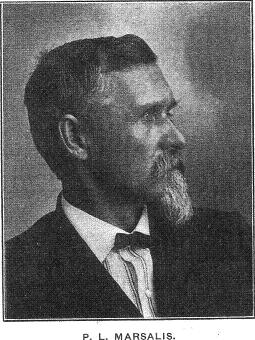
P. L. MARSALIS.
[p. 212]
On the 11th of October, 1866, he was married to Miss Lou A. Garner, now deceased. Several children were born to them.Mr. Marsalis chose teaching as his life work. His first school in 1866 was located within half a mile of his old home. He was for seven years the principal of the Liberty Male and Female College, at Liberty, Miss., during which the school had a large patronage. Afterward he was in charge of the Peabody School at Summit, Miss., for four .years. At present (1908) he is principal of the Osyka Graded School at Osyka, Miss. He is an energetic teacher and does faithful work, being a thorough Baptist and a good man. He was clerk of the Association three years — 1893.1894 and 1895.
1895 — Sarepta, in Franklin county, is the place of gathering on the 11th of October. This church being on the northern border of the Associational territory, the delegation is small. J. P. Hemby is chosen to preside, P. L. Marsalis is continued clerk, and T. J. Hewitt is selected to carry the purse. The visitors are as follows:
Union Association — W. W. Bolls, I. N. Garrett, W. W. Cubet and J. E. Lowe.
Central — M. J. Derrick.
Carey — C. A. Pritchard and T. P. Stewart.R. J. Stewart made report of work done since the last meeting of the body, viz.: Miles traveled, 2,127; sermons delivered, 150; visits made, 348. He had also conducted nine funeral services and celebrated eight marriages. He stated that it had been the hardest year's work of his ministry, and that the spiritual condition of his churches was "lamentably low."
W. J. Weatherly reported nine sermons, seven to white people and two to colored congregations. No further report appears from any of the pastors.
On the second day of the meeting W. W. Bolls preached the Associational sermon from Matthew, 3:15.
About this time there began to be some confusion in the Association on matters of doctrine, as the following preamble and resolution, adopted at this meeting, will indicate:
"Whereas, it has come to the knowledge of this Association that rebaptism is practiced by the Galilee Baptist church to an unlimited extent, unwarranted by the Scriptures, and,
[p. 213]
"Whereas, there is no diminishing of this heresy — on the contrary, a growing increase; therefore, be itThe following item is taken from the report on temperance:
"Resolved, That this Association enters her solemn protest against any further practice of this heresy within her bounds, and we do solemnly declare our nonfellowship for it.""While we may not believe that the use of tobacco is a sin, yet we are bound to admit that it is a useless and filthy habit, though it may be a luxury to all of us who are addicted to it, as also to the one who likes the habit of drinking. It will not rise up and enter our mouths unless we put it there. If the American people would take the nine hundred million dollars expended for whisky and the six hundred million expended for tobacco, and donate it to the Master's cause in mission work (one thousand dollars to each missionary), it would place in the field one million five hundred thousand missionaries—enough to send the glad tidings to every known portion of the globe, enough to evangelize the world."There was preaching during the meeting by Elders M. J. Derrick, J. P. Hemby, Z. Lofton, J. E. Lowe and J. E. Phillips. And a few changes of pastors had been made. Thomas Lansdell served Amite River and New Providence; M. T. Martin was pastor at Gloster; J. R. Baham preached for Zion Hill; W. P. Price ministered to Summit; B. Y. Alford served New Hope (Amite), and I. Allmond was pastor of Jerusalem.After the usual reports had been received the body adjourned, with Mt. Olive as the place of next meeting.
[p. 214]
T. J. Hewitt was born in Amite county, Miss., and has continued his residence there all his life. He united with Mars Hill church when young and has been an active member in the benevolent work of the church. In 1871 he was married to Miss Emily Lofton, and to them nine children have been born, eight sons and one daughter. Their eldest son, W. A. Hewitt, is pastor of the
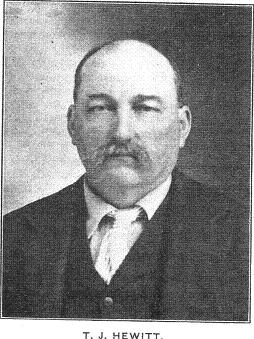
T. J. HEWITT.First Baptist Church of Columbus, Miss. They have in their family one preacher, three doctors, one lawyer and two farmers, while the youngest son has not decided on his life work.
Mr. Hewitt has served as a member of the County School Board since 1904. He is a well-to-do farmer, living eight miles west of Summit. He was treasurer of the Association four years, from 1895 to 1898, inclusive.
[p. 215]
Samuel J. Ellzey was born in Pike county, Miss., July 26, 1867, being a son of B. F. and Emily Ellzey. He professed religion when seventeen years of age, uniting with Silver Springs church. He at once entered into active service, and the church soon recognized his God-given talents, and gave him license to preach. His education was received in the public schools, in the Gillsburg Collegiate Institute and at Houston, Miss. He was married to Miss Mary A. Pittman, Sarepta, Miss., on the 12th of February,
1894. His ordination occurred at his home church, May 17,1896, the presbytery being composed of Elders E. M. Schilling and J. N. Fortinberry. Feeling the need of further preparation, he studied one year at the Seminary in Louisville. Ky., and then located at Anding, Miss. He was pastor here and at Concord, a country church near by. He was growing into a strong and useful preacher, having the confidence and esteem of his people in a high degree.
SAMUEL J. ELLZEY.
[p. 216]
During his short stay at Anding a neat and substantial house of worship was erected, on which he labored with his own hands. He was a young man of deep personal piety and took a broad view of Christian duties and privileges. On the 8th of July, 1902, in the beginning of what seemed a long and useful life, the Master called him away. To us it seems that one so young, pious and capable should have been spared many years, but the Divine One saw it otherwise, and we dare not question His wisdom and goodness.Mr. Ellzey's memory is cherished by a large circle of relatives, friends and acquaintances. In the church cemetery at Concord, Yazoo county, where he ministered to the saints and preached Christ to sinners, his body reposes, waiting the Lord's return.
1896 — The ninetith annual session was held with Mount Olive church, Amite county, beginning October 9th. The opening sermon was preached by T. C. Schilling, from Matthew, 12:42, "A greater than Solomon is here." Twenty-nine churches were represented, and in organizing the body E. A. Bates was chosen moderator; T. C. Schilling, clerk, and T. J. Hewitt, treasurer. And the following visitors from other bodies were present: Bogue Chitto Association, W. R. Johnson and W. R. Walker; Chickasahay, J. A. Hackett, of the Baptist Record; Convention Board, A. V. Rowe; General Sunday School Convention, T. R. Godbold. H. P. Hurt represented the Baptist Layman, and Elder C. S. Ray was present as colporteur of the Convention Board.
The various committees were named, and reports on missions and Mississippi College were presented and discussed on Saturday morning.
The matter of doctrinal difference in the Association noted a year ago was assuming definite form by this time, many brethren, both preachers and laymen, honestly dissenting from the doctrinal views and teaching of Elder M. T. Martin. There were those in the Association who felt that some expression should be given relative to the matter, and on Saturday afternoon a set of resolutions was introduced by J. H. Lane, expressing dissent from Mr. Martin's views. The resolutions were discussed until a late hour, mainly by M. T. Martin and T. C. Schilling, when further consideration was deferred until Monday.
[p. 217]
The preaching on the Lord's day was done by Elders J. A. Hackett, Thomas Lansdell, S. W. Sibley and W. J. Weatherly, services being held both in the house and in the grove.On Monday morning the deferred resolutions relating to M. T. Martin's doctrines were taken up, when a motion was made to lay them indefinitely on tlie table, J. R. Sample, of Summit, offered a substitute, by which the editor of the Baptist Record was requested to allow Elder M. T. Martin and such a representative brother as the Association might appoint the use of his columns for a free and thorough discussion of the doctrines complained of. To this substitute there was unanimous consent, and a committee of three — viz., Thomas Lansdell, S. W. Sibley and J. H. Lane — was appointed to select someone to hold the discussion with Mr. Martin. This committee selected R. A. Tenable, of Meridian, Miss., but the discussion was not had, and, so far as known, no report of the matter was ever made to the Association.
Two resolutions were offered, one by M. T. Martin, the other by J. R. Sample, condemning the action of the last Association
"Resolved, That, on the question of rebaptism of one who was formerly baptized in unbelief, it is the right of each church to act in her sovereign capacity." To be true to the facts of history, it is proper to add that the foregoing matter occasioned a breezy discussion and much general comment. But the difference was one of doctrinal teaching,, and did not involve personalities or questions of morals.
Letters of dismission were given McComb City, New Hope (Amite), Mount Vernon, Amite River and Jerusalem churches.
[p. 218]
E. A. Bates, of Marshalton, Miss., was born September 6, 1858. Like many of our best men, he was reared on the farm, receiving his education in the common schools of the country. He takes an active interest in affairs of church and state, and is a pious and worthy citizen. His wife was Miss Minnie Quin, a daughter of the late Elder H. G. Quin.In addition to his farming interests, Mr. Bates for a number #f years has dealt in livestock, having a good acquaintance with
the Western markets, and enjoying the confidence and esteem of the trading public.
E. A. BATES
He professed religion in 1880, uniting with East Fork church, and in 1896 was ordained to the office of deacon. He served as moderator of the Association four years, from 1896 to 1899, inclusive, and presided with ease and ability. He is a firm friend to his pastor, an essential quality in a good deacon.
[p. 219]
1897 — The meeting was held this year with New Providence church, beginning November 25th. This was owing to the appearance of yellow fever at a number of places in the State. The session continued two days, and eleven churches were represented. The appointee and alternate both being absent, J. L. Johnson, a visitor, by request, delivered the annual sermon. B. A. Bates and T. J. Hewitt were re-elected moderator and treasurer, respectively, while Elder E. Gardner was chosen to keep the records.Resolutions were adopted expressing sympathy for the fever-stricken sections of the South, and invoking the Divine comfort and relief for the sufferers.
The usual committees were appointed, and the subjects of missions, religious literature, temperance, pastoral support, etc.. were considered.
The doctrinal differences existing in the Association had not subsided by this meeting; on the contrary, they had grown more pronounced. The membership of Galilee church, of which Elder M. T. Martin had been pastor, were divided in sentiment, those agreeing with Pastor Martin finally withdrawing and organizing another church. Mr. Martin was also pastor of Zion Hill, one of the oldest churches ia the Association, and this church, of course, stood with her pastor. On this account the Association passed the following act:
"Whereas, Zion Hill church has published resolutions indorsing M. T. Martin in full as a Baptist preacher, and as his teachings bring destruction to the peace of Zion, and are out of line with regular Baptist teaching:Later another set of resolutions was adopted, expressing strong dissent from Mr. Martin's doctrinal views, and giving notice that any church in the Association that might engage him as pastor would forfeit its membership in the body. The resolutions also contained a request to the churches which had gone off to return to the old faith and to regular Baptist organization."Resolved, That this Association withdraw the hand of fellowship from said church and its pastor."
These matters, being a part of the Association's history, are given as nearly as possible as they occurred in the proceedings of the body. Mr. Martin had decided convictions, and he maintained them with unusual vigor and ability; and, while this division was greatly deplored, it is believed that no ill-will is cherished for his memory.
[p. 220]
Elisha Gardner was born in Amite county, Mississippi, April 22, 1867, and was reared on the farm, attending the public schools until eighteen years of age. He then taught school in his native county for four years. His marriage to Miss Demarias Day occurred in 1888. He was converted and united with Mars Hill church when eighteen years old, and was ordained to the work of the ministry in his twenty-fourth year. Since his ordination he has served full time as pastor of churches in Amite and
Franklin counties. He is at present (1908) the pastor of New Providence and Ebenezer churches, having served the former for the past twelve years, and the latter six years, and is happy in his work.
ELISHA GARDNER
Mr. Gardner is original in his thinking and methods; is a fluent speaker and a popular preacher. Being in the prime of life, and of good health, he is promised many years of usefulness and power.
[p. 221]
John P. Culpepper was born in Lawrence county, Mississippi, September 27, 1866. His early life was spent on the farm, attending the public schools until he was eighteen years of age, when his father "set him free" to get an education. He continued to attend the neighborhood schools for two and a half years. He was converted at the age of sixteen under the preaching of Elder E. Drummond, being received into the fellowship of Crooked Creek church. In the summer of 1887 he felt impressed to become a preacher of the gospel, and was accordingly licensed by his home church the following year. He then entered
Mississippi College, graduating in 1893, with the B. L. degree. He preached during the summer months, some of his best meetings being those held during his college days. He also studied at the Southern Baptist Theological Seminary at the session of 1898-94. He was ordained in June, 1894, Elders E. Dmmmond and J. C. Buckley composing the presbytery. His first pastorate was at Columbia, Miss., 1895 and 1896. He also preached for Monticello, Society Hill, Ebenezer and Cedar Grove churches.
JOHN P. CULPEPPER
Mr. Culpepper was married to Miss Rosa Lee Bacot, September 9, 1896. He next accepted the care of the church at Gloster,
[p. 222]
Miss., remaining there six years. During this time a. pastor's home was built and the work organized along lines of denominational progress.In 1903 he accepted work as pastor at Lumberton, Miss., remaining two years. While here a pastor's home was erected and the church left in good condition. He next accepted a call to Poplarville, Miss., his present field, where he has been greatly blessed. A pastor's home has also been built here and the church membership doubled.
Mr. Culpepper has done considerable evangelistic work, in which many have been saved. He has now been preaching thirteen years, and has seen more than 2,500 persons unite with the churches, besides leading in the work of building a number of houses of worship. With this fine record of work we may safely predict for him a career of great usefulness.
1898 — Ebenezer is the place of meeting, and the time November 25th. The lateness of holding the session was because of the appearance of yellow fever for some years immediately preceding this time. The attendance was small, as is usually the case at so late a date in the year. The former officers were re-elected — viz., E. A. Bates, moderator; E. Gardner, clerk, and T. J. Hewitt, treasurer.
E. H. Garner and J. E. Lowe came as corresponding messengers, the former from Carey Association and the latter from the Union. Secretary Howe came from the Convention Board.
J. P. Culpepper preached the annual sermon.
On the Lord's day Elder A. V. Kowe preached and took up a collection for missions.
J. E. Lowe offered the following in connection with the report on temperance: "Intoxicating liquor is the fine blood of the gambler, the element of the burglar, the prop of the highwayman, and the support of the midnight incendiary. It burns up men, consumes women, detests life, curses God and despises heaven. It murders the soul; it is the sum of all villainies, the father of all crimes, the mother of all abominations, the devil's best friend and God's worst enemy."
This item is taken from the report on ministerial education, written by W. B. Kinabrew. "The leaders and instructors of our churches must of necessity be themselves well instructed. One cannot teach others if he is ignorant. The blind cannot lead
[p. 223]
the blind. The shepherd cannot lead the flock into green pastures unless he knows where the pastures are and the places of shelter and safety. That uneducated preachers have, in times gone, done much good, and built up the cause of Christ, is emphatically true. But these times and conditions have forever passed. In these days of steam, electricity, daily mail, public schools and colleges, the people are becoming better educated and more intelligent, and, of necessity, their leaders must be in advance of them. There is no profession or occupation that needs more thorough and diversified education than that of our preachers.A good report on Sunday schools was presented by E. W. Roark, whose home was at Ebenezer, and whose memory is cherished. not only in his own community, but elsewhere as well.
The meeting was short, and nothing of unusual interest occurred.
1899 On the 6th of October the saints assembled at Bethlehem church, Amite county, to hold the ninety-third annual meeting of the "old Mississippi." H. H. Ratcliff and Chas. Hooper were the reading clerks, and the body was organized by retaining E. A. Bates and E. Gardner as moderator and secretary, while Sam B. Robinson was chosen custodian of the funds.
An address of welcome on behalf of the church and community was made by Pigot Lea, and the response for the Association was made by Edgar Godbold.
The visitors from other bodies were: J. B. Lawrence, from the Yazoo Association; H. D. Scarborough, from the Fair River; H. S. Archer, from the Carey, and D. M. Huff, from the Bogue Chitto.
Elder E. Gardner preached the annual sermon at the beginning of the evening session on the first day.
The following resolution was presented by J. H. Lane, and adopted:
"To the Hon. F, A. McLain and the Hon. Pat. Henry:"We, the Mississippi Baptist Association, now in session, do hereby most respectfully ask you, as our Congressmen, to use your splendid ability to secure the prompt expulsion of Brigham H. Roberts, of Utah, the avowed polygamist and covenant-breaker, from Congress."
[p. 224]
Elder S. H. Thompson, now growing old and feeble, was in the meeting, and, in recognition of his past services, a collection was taken for his benefit.A mass meeting was held on Sunday morning, conducted by J. E. Baham, and the report on Sunday schools was read by T. J. J. Spurlock. The preaching on the Lord's day was done by J. B. Lawrence and H. S. Archer, the former in the house and the latter in the grove.
A fine report on "pastoral support" was presented by H. H. Ratcliff, chairman of the committee, from which this extract is taken:
"Of all professions, we conceive of none where adequate remuneration is more sacred or obligatory than money which rightly belongs to the gospel minister. When we, through negligence or indifference, withhold our support from our preachers, we greatly impair and handicap their usefulness. No minister is competent to teach or rightly divine the Word of God without giving his whole time to the study of the Bible. No lawyer, physician or other professional man can consume time with anything else but his avocation, unless he suffer. This same undivided and constant attention to ministerial work will also suffer if pastors are compelled to resort to outside duties to secure a livelihood."The other members of the committee with Mr. Ratcliff were Ardry Toler and Henry Ballard.The report on "church discipline," among other things, says: "One of the greatest difficulties with which we have to contend is the fear of wounding feelings and giving offense, and thus frequently members are allowed to go on in gross sins, such as profanity, drunkenness, etc. The command is plain and emphatic to withdraw from those who walk disorderly, and yet, because of this fear, we often hold our peace and the cause of Christ suffers. Let our people -consider which is the more serious, to grieve the Holy Spirit or wound the feelings of the offender."
For several years the minutes of the General Sunday School Convention have been published with those of the Association. The Convention met this year with the Gloster church and Sunday school on April 29th. and held a two days' session. Ten schools were represented, as follows: Gloster, Liberty, New Providence, Mount Olive, Hebron, Bethlehem, East Pork, Hominy Creek, Bbenezer and Gillsburg.
M. H. Martin was elected president, and S. B. Robinson secretary. Quite a number of essays were read, and some fine discussions
[p. 225]
were had. At eleven a. m. on the Sabbath T. C. Schilling preached to an immense congregation from Isaiah, 62:1. Theme, "Christian Zeal."The following list will indicate the arrangement of pastors and churches this year:
J. J. Walker was bishop of Bethel, Hebron and Mount Pleasant; T. C. Schilling served Bethlehem, Gillsburg and Liberty; E. H. Hanlin was pastor at Concord; Thomas Lansdell preached for Ebenezer; J. H. Lane ministered to East Fork; J. P. Culpepper was bishop at Gloster; E. Gardner served Hopewell, New Providence and New Zion; J. B. Lawrence was pastor of Mars Hill; J. L. Price preached for Mount Olive; J. E. Lowe served Mount Zion; Z. Lofton ministered to New Salem and Siloam; J. E. Wills preached for Ramah; J. R. Mullins was pastor of New Hope, and R. J. Boone preached for Whitestown.
J. Benjamin Lawrence was born in Rankin county, Mississippi, July 10, 1873. When he was three years old his parents moved to Goshen Springs, Miss., a small town in the northern part of the county. Here his boyhood days were spent until
J. BENJAMIN LAWRENCE
[p. 226]
he entered Mississippi College in 1895. From this institution he was graduated with the A. B. degree in 1899, and with the M. A. degree in 1901. While in school he served country churches, his full time being occupied. During his last year at College he was pastor of Mars Hill church, Mississippi Association, continuing in this service until called to the pastorate at Greenwood, Miss.In the fall of 1900 Mr. Lawrence was married to Miss Helen Alford, of Goshen Springs, Miss. During his two years at Greenwood there was a large increase in the membership, and a pastor's home was built. From here he went to Brownsville, Tenn., where he served as pastor for two years, during which there was a marked increase in the membership and in contributions, the latter nearly doubling. His next move was to Humboldt, Tenn., where he was bishop for three years. In the matter of contributions, the church went from $1,600 to $3,600, being the leading church in the State in the amount of money given for benevolent work. There were also constant accessions by experience and baptism.
In April, 1907, Mr. Lawrence assumed the care of the Coliseum Place church, New Orleans, his present charge. During his first year here there were seventy-five additions to the membership, more than one-half of whom came in by baptism. During the first half of the present year (1908) there have been few Sundays without baptisms. Mr. R. H. Brown, the senior deacon of this church, says: "There has never been a year in the history of this church during my period of membership in which there has been such marked prosress as there has been this year." In accepting the call to the Coliseum Place church, he sent the congregation this message: "I am coming to you with the purpose of doing the work of my life.''
Mr. Lawrence is specially gifted in oratory. He was a distinguished speaker during his college days, winning a medal at Natchez. Miss., in 1899. With consecrated powers of mind and heart, a career of great usefulness is promised him.
[p. 227]
J. J. Walker was born near Westville, Miss., April 21, 1853. He professed religion when seventeen years old, uniting with the church at Cato, Miss. He was married to Miss Sarah J. Brown in February, 1876. He was licensed to preach in 1877, and was ordained in 1879.For ten years Mr. Walker served churches in Simpson and Covington counties, when he moved to Hebron, Lawrence county,
serving two years as missionary of the Strong River Association. During this time his wife died, and he resigned his work and moved to Wesson, Miss. His second marriage was to Mrs. Fannie Pettigrew, February 8, 1898, and in November of that year he moved to McComb City. His next move was to Amite county in 1898. Here he spent ten years more of active work, serving a number of churches within the bounds of the "old Mississippi."
J. J. WALKER
[p. 228]
Mr. Walker is an ardent friend of missions and an uncompromising advocate of prohibition. His reports and speeches, especially on these two subjects, will long be remembered in this Association. His last home in Amite county was at Gliding, on the Liberty-White Railroad. At the close of 1906 he reigned all his work with a view of going West, but, under the divine leading, he accepted work at Shubuta, Miss., his present field.Mr. Walker is an active and zealous pastor, and, like all faithful preachers, has experienced many trials and difficulties; but it is his fixed purpose to give himself wholly to the Lord's work until He shall say, "It is enough; come up higher."
Sam B. Robinson was born near Liberty, Miss., September 11, 1869. He was educated in the common schools and in the Liberty Male and Female College, afterwards taking a teacher's training course under Prof. A. H. Ellett and others at Iuka, Miss. He began office work as a bookkeeper at Gloster, Miss.,
SAM B. ROBINSON
[p. 229]
in 1894. He was married February 12, 1896, to Miss Delia May Jenkins, and located this year at Liberty, organizing the W. L. Robinson Company, of which he is still the manager.He was elected superintendent of the Liberty Baptist Sunday school in 1900, and ordained to the deaconship in 1901. Under his leadership the Sunday school has grown to more than one hundred pupils, has a full set of officers and teachers, and is one of the most efficient and liberal Sunday schools In the country. They also have a branch school with an enrollment of some thirty-five or forty pupils.
Mr. Robinson is likewise a zealous and faithful deacon, a good business man, and is of strong help to his pastor, his church and community. He was treasurer of the Association in 1899.
James B. Quin was born near Marlin, Texas, July 8, 1874. His parents, Mr. and Mrs. John H. Quin. moved back to Pike county, Mississippi, in the fall of 1874, and settled on Bogue
JAMES B. QUIN
[p. 230]
Chitto river, where the subject of this sketch was reared. He united with Friendship church, near McComb City, in 1893, and was ordained to the ministry at this church in 1900. He received his education in the public schools and in Mississippi College, spending five years at the latter institution. While in college Mr. Quin was fall orator of the Theological Society one session, and during his senior year was first orator on the anniversary occasion. In addition to his college course, he has spent one session at the Broughton Bible Conference, Atlanta, Ga.He has served Mount Zion, Mars Hill and Liberty churches in the Mississippi Association; also, Friendship, Shady Grove and East McComb, in the Bogue Chitto Association. He was pastor at Yazoo City, Miss., for fifteen months. He is at present (1908) located at Prentiss, Miss., on the Mississippi Central Railroad, wehre he has a growing work. His wife was Miss Myra E. Dodds, of near Hazlehurst, Miss., to whom he was married January 12, 1904. He is a young man of energy and consecration, with fine possibilities before him. He is a grandson of the late James B. Quin, for whom he was named, and who was for many years prominently connected with the Mississippi Association.
[p. 231]
W. A. Hewitt was born in Amite county, Mississippi, January 4, 1876. He is the eldest son of T. J. Hewitt, and was reared on the farm, attending the public schools until he was eighteen years of age, when he entered Mississippi College, spending five years in that institution and graduating with the B. A. degree. He professed religion while quite young, uniting with Mars Hill church. He was early impressed that it was his duty to
preach, and so did not delay the work. His ordination to the ministry occurred at his home church, the ordaining council being composed of Elders J. H. Lane and A. V. Rowe.
W. A. HEWITT
After graduating from. Mississippi College, Mr. Hewitt accepted the principalship of the Osyka Graded School, Osyka, Miss., teaching one session and preaching to five churches. He then took a course of study at the Theological Seminary at Louisville, Ky., and has also studied at the University of Chicago. His next field of labor was at Columbia, Miss., where he
[p. 232]
remained three and a half years. He was married January 22, 1902, to Miss Olive Haley, of McComb City, Miss.In 1905 Mr. Hewitt accepted his present charge at Columbus, Miss., since which time the membership of his church has been largely increased, and a new house of worship erected at a cost of $40,000. He is a fluent speaker, and, as his lifework is just beginning, he has the promise of large usefulness and power.
============== [From T. C. Schilling, Abstract History of the Mississippi Baptist Association, From Its Preliminary Organization in 1806 To The Centennial Session in 1906, 1908, pp. 199-232. - Scanned by Jim Duvall].
